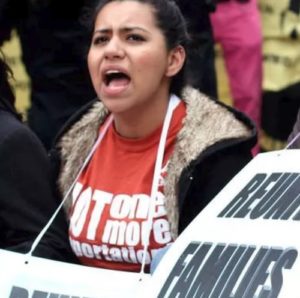
When Sandy Valenciano was four years old, she and her family made an arduous journey to the US from Zacatecas, Mexico. Now 24, Sandy is still undocumented due to a broken immigration system in the US. While she has had temporary protection from deportation since 2012, under the Deferred Action for Childhood Arrivals (DACA) program, the President’s September 5 decision to end DACA means that Sandy could be deported at any moment to a country she doesn’t even remember.
Sandy’s status hasn’t kept her from advocating for the rights of all immigrants. She became an organizer in 2011 while studying at Sonoma State University. There, she was often the only undocumented student and woman of color in her class. Feeling isolated and disconnected, she joined the North Bay Immigrant Youth Union (NBIYU) and began connecting with other undocumented youth in the region. She soon began working with California Immigrant Youth Justice Alliance (CIYJA), organizing and advocating for policies that would improve the lives of undocumented people at the local and state level.
Sandy and her family have lived the difficulties of being undocumented in the US. Her father’s car was impounded on several occasions after routine traffic stops, because until 2015, undocumented residents in California were not eligible to apply for a driver’s license. His employment situation was equally tenuous – he could be laid off for any reason and had no legal way to fight back. Sandy’s mother was often rushed to the emergency room because she wasn’t eligible for any form of health coverage. “I used to think that my family had bad luck,” she says. “But I realized that it wasn’t just bad luck, it was the experience of undocumented people in the US.”
After college, Sandy continued working at CIYJA, where she became a coordinator. Among many activities, she began facilitating “know your rights” trainings to help undocumented families know what to do and say if they are detained or arrested.
Since the anti-immigrant rhetoric began growing in the run-up to last year’s presidential election, the undocumented population has been on high alert.
Soon after the election, CIYJA turned to The San Francisco Foundation’s Rapid Response Fund, which helps organizations respond quickly to unanticipated challenges or opportunities around racial and economic equity. In less than two weeks, CIYJA received $10,000 to provide additional “know your rights” trainings and to step up their deportation defense efforts.
The funding has been invaluable, Sandy says. CIYJA worked with students, teachers, and churches across the Bay Area to train nearly 1,000 people. Attendees learn how to respond if they are confronted by immigration agents, including how to document encounters with agents, and what to do to stay safe. CIYJA has created a detailed curriculum, role-playing exercises, and has set up a hotline staffed by volunteers who can advise callers about their rights. When people are detained, CIYJA helps locate them in the detention system, and even helps run public campaigns to demand for their release.
Sandy knows that being an undocumented organizer comes with risks, but for her, the work is more important than her own security. Like the people she trains, Sandra has her own emergency plan. “We live with the risk of deportation every day,” she says. “But I am not afraid.”
Author: Eric Brown, foundation consultant

